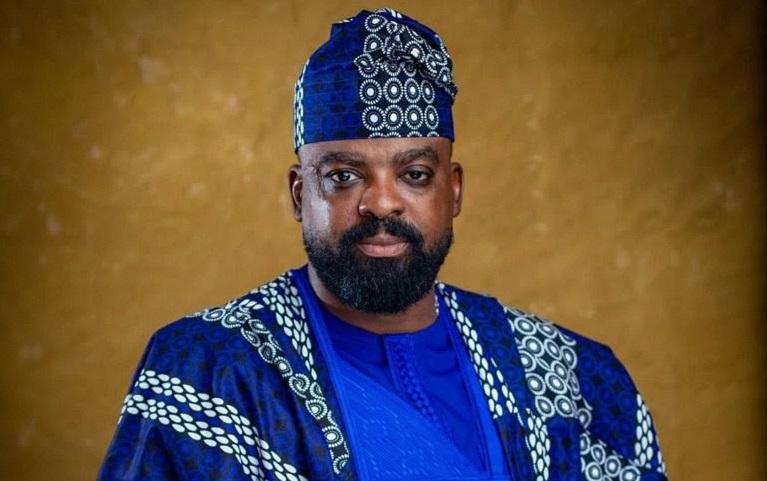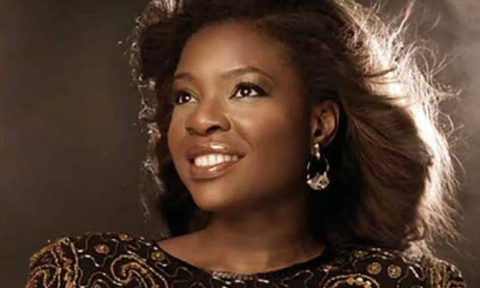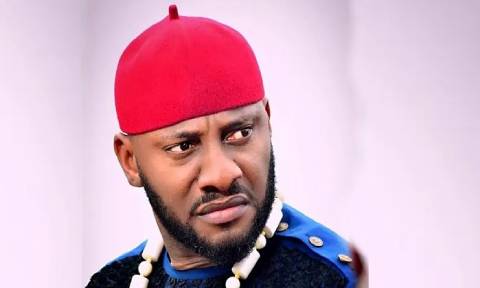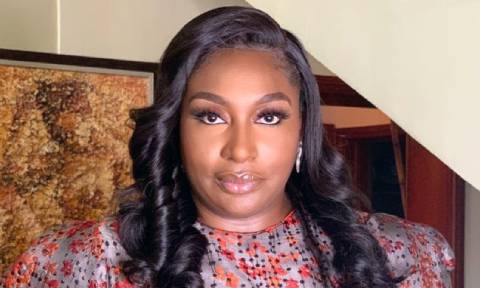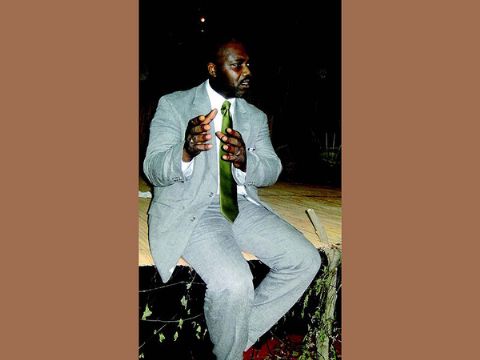
British and American trained actor and theatre director, Nick Monu, is the director of The Swamp Dwellers. The widely travelled thespian returned to Nigeria in 2008 after several years abroad. He speaks to NEXT on Sunday about the production and his craft.
The Swamp Dwellers
Nick Monu was working at the Austrian National Theatre when he wrote Ahmed Yerima, Director General of Nigeria’s National Theatre, to say he would love to work on a production at home.
The two had their first encounter in 1992 during a production of The King Must Dance Naked. Meeting again last year. Yerima convinced Monu to direct The Swamp Dwellers instead of the play the latter originally had in mind, A Dance of the Forest.
Monu wanted to do A Dance of the Forest (first staged in 1960) to commemorate Nigeria’s 50th independence anniversary next year.
He therefore had reservations about Yerima’s suggestion. “Fools rush in where angels fear to tread,” he says of The Swamp Dwellers now. “It’s more than a simple play and I thought: my God, I don’t know if I can do this play. Very short, very small, but it has great depth.
I said: this is a Soyinka play I don’t know. But as I read it, I found it’s an interesting play, and I started to fall in love with it. And as I got my artists together, and as we started to read it, I realised just what a masterpiece it is.
“It’s fantastic theatre, very naturalistic. [Soyinka] investigates [the] problems of our people. He chose to set it in the Niger Delta. It’s 1959. We had not even got our own country completely and this man is foreseeing problems in the [Niger] Delta.
Amazing! The play investigates the breakdown of family and society as a result of people moving from [an] agrarian culture to suddenly become city folks. What happens to the mores and ideals of the people when that happens? What happens to those who are left behind?
In other words, what happens when people leave their homeland? I don’t think he wants to force us to stay in our past but I believe he is saying maybe we should think about it along the process of letting go of our past,” Monu says.
Wole Macaulay as Makuri
Wole Macaulay, who plays Makuri in the production, also played the lead role in the recent National Theatre production of Ola Rotimi’s play, Kurunmi. Why choose him again this time? Doesn’t that hint at favouritism?
Monu replies without missing a beat. “I auditioned 45 artists and picked the artists I picked. Macaulay is a fantastic actor that can stay on any stage.
He truly is a very talented actor, great stature and I hope that this production helps to show just how skillful the man is. I’m very lucky to have a very talented group of actors. I don’t believe it was by chance we auditioned, met ourselves and started to work together.
They’ve been very brave to further my techniques of working. They have let themselves completely in and I hope that the press is kind to them and to us in our attempt to do a very naturalistic piece of Soyinka’s work.
It’s not easy because it’s not like many of his plays. When he wrote it, he was still in England and in many ways he was writing it for a European audience. Although it’s a Nigerian play, he’s writing it with European mores and techniques. Then he came back in A Dance of the Forest.
He was here and so he had already changed his style, realising what’s on ground – there is dancing, music, drumming and comedy in it. But The Swamp Dwellers is just straight talking, straight drama, one hour and ten minutes of unadulterated tragedy.”
Why he left Nigeria
Leaving Nigeria at a tender age was not of Monu’s making. “After Biafra… I’m from Asaba on my father’s side, my mother is from Ijebu Ode. After the war, I think my dad felt it best we left the country. He was an accountant and he was lucky enough to be able to afford to send me to school in Europe.
So I went to school in England from age five to nineteen and I used to come back home every holiday. It wasn’t a choice. Sometimes I think it was a positive thing because I have gained from it.”
Journey into theatre
The director knew from an early age he wanted to be in theatre. “I was one of those weird individuals who from the age of about five knew that I wanted to be an actor and a theatre person.
It actually was my dream since I was a small child to go away, learn as much as I could about my craft, come back to Nigeria and start a theatre company. I’ve never known anything else, I’m trapped inside that dream,” he says with a throaty laugh.
Plans for his own theatre company have been scaled down because of funds. “I’m trying to start something small. I initially had plans to start a very large theatre company.
I got an architect from Austria to design a huge place but I realised nobody was going to give me the kind of money I needed to do that. So, I made the thing much smaller and tried to build on a few plots in Mowe.
Again, it’s still too expensive for my own capacity. What I’m thinking of doing now is starting something much smaller with a studio theatre and a drama school attached.”
From acting to directing
Monu believes there is no big deal about his transition from acting into directing. “I’ve always directed both theatre and film in-between. I’ve always seen it as a natural progression and I’ve always wanted to be a director.
I believe that directing has so much to do with understanding the way actors work, that you always have to be an actor first to really understand… Some special people can manage to do that without having undergone that process.”
Nigerian theatre
Although he is happy to find that Nigeria’s theatre culture is vibrant, he believes it can be better with more funding. “We still have the chance to move it forward to where it needs to get to. Obviously, funding is dire.
We have a fantastic place here (the National Theatre), an amazing facility, but there is not enough funding for it to do what it really needs to do. I find it wonderful that Nollywood has happened but there are no spaces for people to work.
In some cities in Europe, you will find ten theatres within walking distance of each other. We need to think about funding and raising our standard as a result. Everything is theatre-based.
Your film will never have the standard you want if it doesn’t start from the theatre. Support the theatre first and there is an immediate effect on films in terms of quality.”
Nollywood: Representative of Nigeria?
Monu, who worked with Austria’s Andrea Breth, and Russian Vladimir Bogomolow for several years in Europe, says the themes of Nollywood films are not representative of Nigeria. “To be honest, what they do is make money. These guys are under stress, nobody is supporting them.
You need to support them financially to release them from the need to just make some money and profit back. They need support and when we realise the importance of supporting our filmmakers, we will see a huge leap. The performing arts need to be supported at a much higher level. People can’t keep on complaining about quality without first being willing to invest.”
Monu favours specialisation and the use of experienced writers for film scripts as a way of improving Nigerian films. “We have wonderful writers, why don’t we go to them for scripts? That’s what I’m going to do. But I think people are scared of the cost.
If I pull in a top class writer, how am I going to pay him? Respect for the craft of writing is something that needs to be learnt. Part of the problem in Nigeria is that people think training in theatre arts is complete in four years but it is not so. One has to specialise. Don’t be jack of all trades, master of none.”


